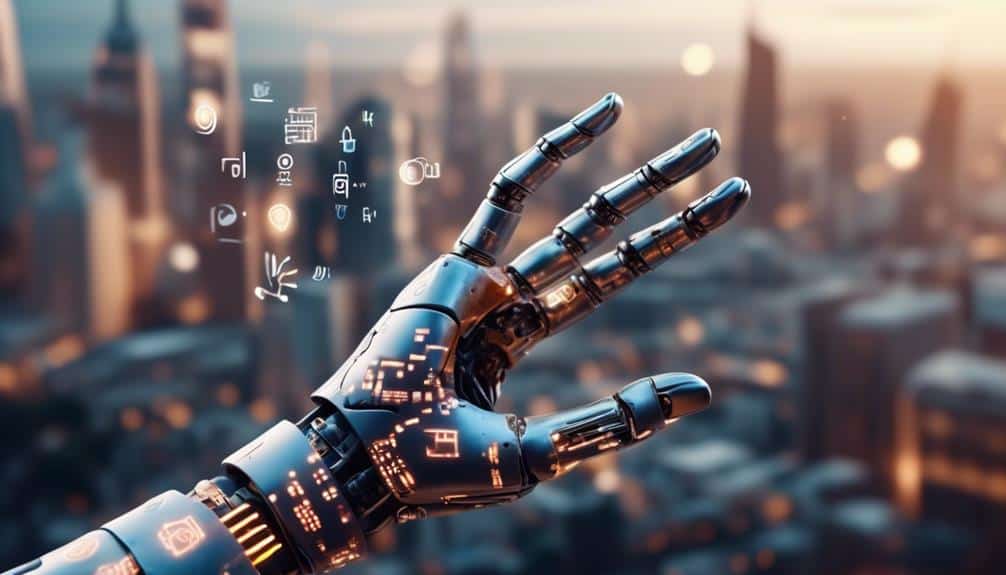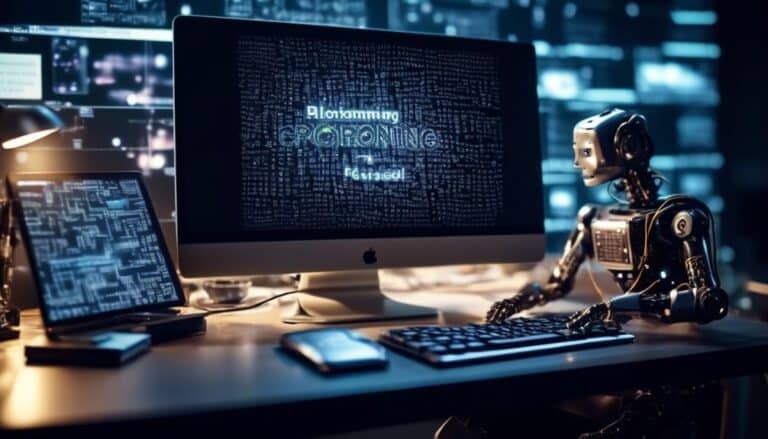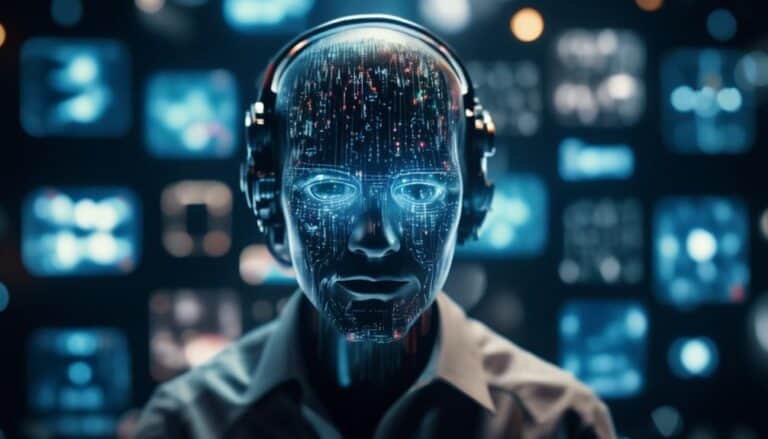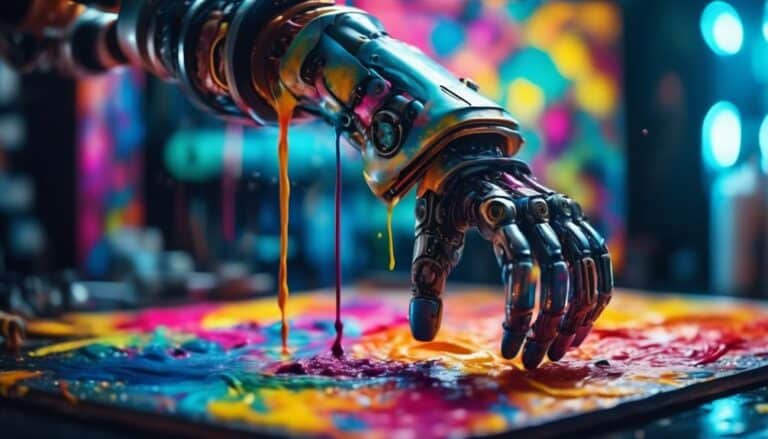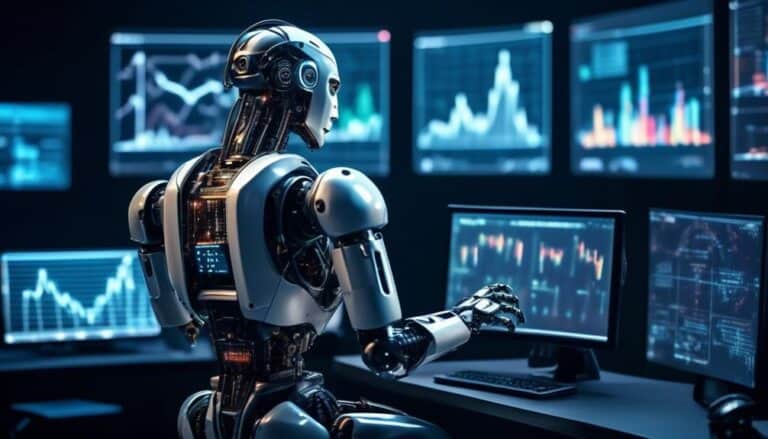The Future of Content Creation: Copyright Challenges and AI Developments
In a digital landscape where content is king, navigating the realm of copyright challenges and the advancements of artificial intelligence can be akin to a strategic game of chess.
As you ponder the implications of AI on content creation and the ever-evolving copyright laws, a complex web of questions arises. How will creators protect their original works in a world where AI blurs the lines of ownership and authorship? What ethical dilemmas will surface as AI-generated content becomes more prevalent?
Join this discussion as we unravel the intricate tapestry of the future of content creation, where copyright challenges and AI developments intersect to shape the creative landscape.
Key Takeaways
- Evolving technologies like AI are reshaping copyright laws and intellectual property protection.
- Content creators must navigate the balance between leveraging AI for efficiency and safeguarding originality in a digital landscape.
- Ethical considerations, such as privacy concerns and biases in AI-generated content, require careful attention in content creation.
- The future of content creation will require clear guidelines on ownership rights of AI-generated works and adaptations in copyright laws to encompass these advancements.
Copyright Laws in the Digital Age
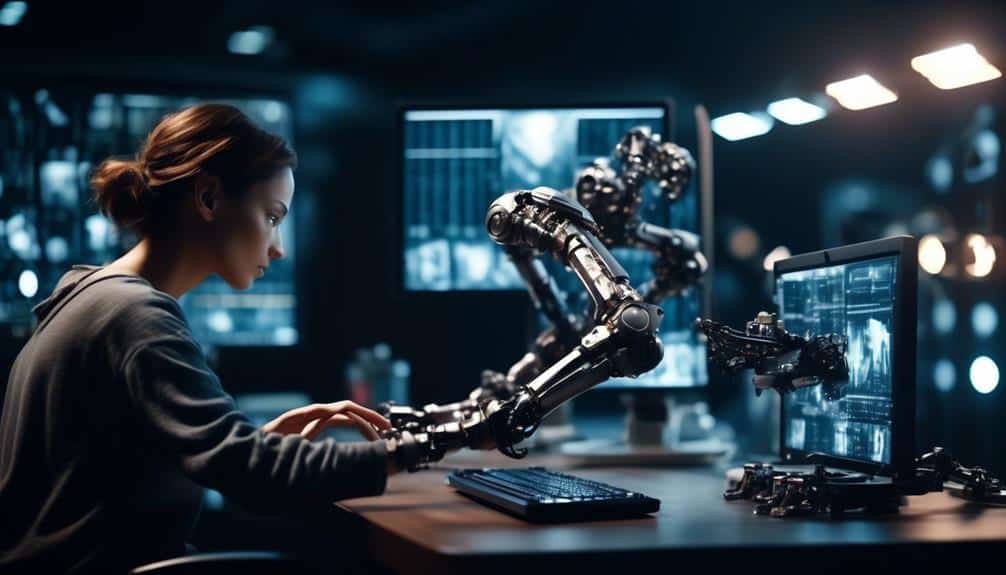
Navigating the intricacies of copyright laws in the digital age requires a keen understanding of evolving technologies and legal frameworks. With the rise of digital piracy, protecting intellectual property has become more challenging. Fair use, a doctrine that allows limited use of copyrighted material without permission for purposes such as criticism, commentary, news reporting, or education, is often misunderstood in the digital realm. It's crucial for content creators to grasp the nuances of fair use to avoid infringing on others' rights while promoting creativity and innovation.
Digital piracy, the unauthorized distribution of copyrighted material through digital channels, poses a significant threat to content creators. The ease of sharing content online has made it easier for individuals to exploit copyrighted works without permission, leading to revenue losses and legal disputes. Content creators must employ robust strategies to safeguard their creations from piracy, including using technological tools and legal mechanisms to enforce their rights in the digital landscape. By staying informed and proactive, creators can navigate the complex landscape of copyright laws in the digital age effectively.
Impacts of AI on Content Creation
AI technology is revolutionizing the landscape of content creation, impacting various industries and reshaping traditional approaches to producing and distributing creative works. As AI continues to advance, its impacts on content creation are becoming more profound. Here are some key points to consider:
- AI creativity: AI is now capable of generating original content, blurring the lines between human and machine creativity.
- Content automation: AI tools can automate repetitive tasks in content creation, allowing creators to focus on more complex and strategic aspects.
- Enhanced efficiency: AI streamlines workflows, speeds up production processes, and improves overall efficiency in content creation.
- Personalization: AI algorithms analyze data to create personalized content experiences for consumers, enhancing engagement and satisfaction.
With AI playing an increasingly prominent role in content creation, it's essential for creators to adapt to these technological advancements to stay competitive and relevant in the ever-evolving digital landscape.
Challenges for Content Creators
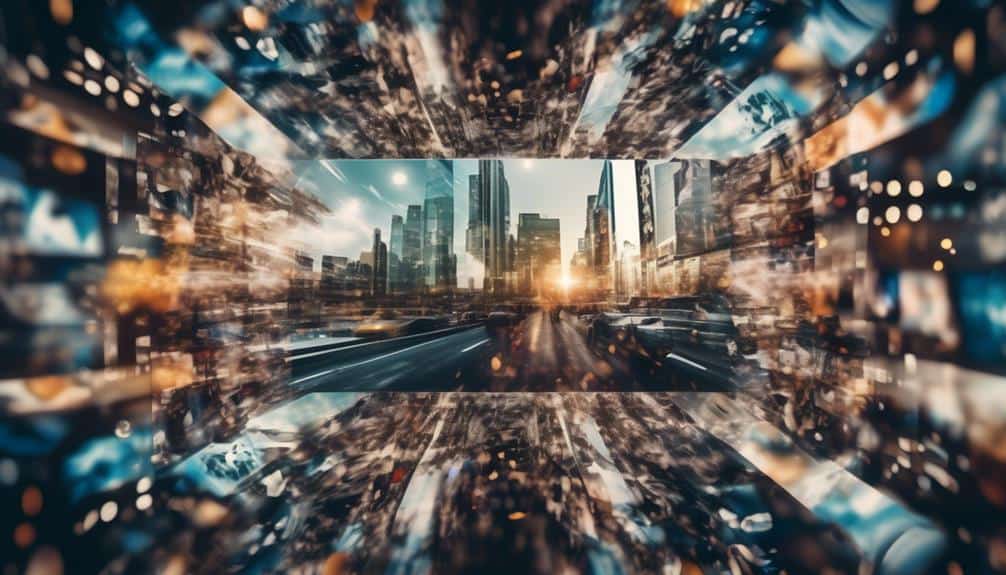
When it comes to challenges for content creators, navigating copyright protection strategies and the rise of AI content generation are crucial aspects to consider. As a content creator, understanding how to safeguard your work in a digital landscape where originality can easily be compromised is essential.
Embracing the opportunities that AI offers while also safeguarding your intellectual property rights presents a delicate balance to maintain in the evolving content creation sphere.
Copyright Protection Strategies
Developing effective copyright protection strategies poses significant challenges for content creators in today's digital landscape. When addressing copyright protection, content creators must navigate a complex terrain of legal considerations and technological advancements.
Here are key strategies to consider:
- Implementing robust digital rights management tools.
- Educating oneself and team on copyright laws and fair use.
- Utilizing watermarking and metadata to track content.
- Regularly monitoring for copyright infringement through automated tools.
These strategies are crucial in safeguarding intellectual property and ensuring that content creators can protect their work in an ever-evolving digital environment. By being proactive and informed, creators can better navigate the challenges of copyright protection.
AI Content Generation
Navigating the landscape of AI content generation presents content creators with a myriad of challenges to overcome. As AI technology advances, the line between human-generated and AI-generated creativity becomes increasingly blurred, raising questions about ownership rights.
Content creators must grapple with the dilemma of who owns AI-generated content and how to protect their intellectual property. Establishing clear guidelines and legal frameworks for ownership rights in AI-generated works is crucial to avoid disputes and ensure fair compensation for creators.
Additionally, distinguishing the level of human input in AI-generated content is imperative in determining copyright ownership. Content creators need to stay informed about evolving copyright laws and proactively address the implications of AI on their creative output to safeguard their work in this rapidly changing landscape.
AI-Generated Content and Ownership
Exploring the legal implications of AI-generated content on ownership rights is crucial in understanding the evolving landscape of content creation. As AI continues to advance, questions surrounding AI ownership rights and content authenticity concerns become more pressing.
- Ownership Rights: Determining who owns AI-generated content poses significant challenges.
- Authenticity Concerns: Ensuring the originality and authenticity of AI-created content is a growing concern.
- Legal Framework: Developing a clear legal framework to address ownership of AI-generated content is essential.
- Intellectual Property: Protecting intellectual property rights in the context of AI-generated content is a complex issue that requires careful consideration.
In this rapidly evolving environment, where AI technologies are increasingly involved in content creation, understanding the nuances of AI ownership rights and content authenticity concerns is paramount. As these technologies continue to shape the future of content creation, addressing these legal and ethical issues will be crucial in maintaining a fair and sustainable creative landscape.
Balancing Innovation and Copyright Protection
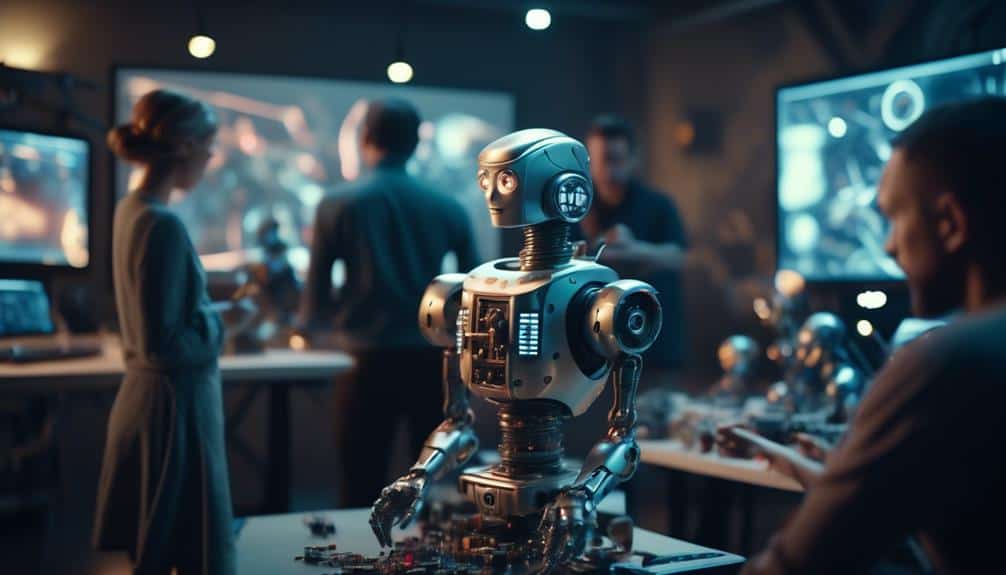
When considering the future landscape of content creation, it's crucial to navigate the delicate balance between fostering innovation and protecting intellectual property rights.
As technology continues to advance, questions surrounding ownership and the source of creative output become increasingly complex.
Finding a harmonious coexistence between promoting creativity and safeguarding copyright will be pivotal in shaping the evolution of content creation in the years to come.
Tech Advancements and IP
In the realm of technological advancements, striking a delicate balance between fostering innovation and safeguarding copyright protection presents a critical challenge for intellectual property rights. As AI advancements continue to reshape the landscape of content creation, the intersection of technology and intellectual property law becomes increasingly complex.
- AI-generated content: The rise of AI-generated works raises questions about ownership and originality.
- Data protection: Safeguarding intellectual property in the age of big data poses new challenges.
- Licensing agreements: Adapting traditional licensing models to accommodate AI-generated content is essential.
- Legal frameworks: Updating legal frameworks to address the implications of AI on intellectual property rights is imperative.
Creativity Versus Ownership
Navigating the intricate balance between fostering creativity and protecting ownership rights in the realm of content creation poses a significant challenge in today's evolving landscape. Creativity is the lifeblood of content creation, driving innovation and captivating audiences.
However, ownership rights, encompassing intellectual property, are crucial for creators to protect their work from unauthorized use or reproduction. Balancing creativity and ownership involves respecting creators' rights while also encouraging a dynamic and innovative content environment.
It requires striking a delicate equilibrium where creators feel incentivized to produce original works, knowing their intellectual property is safeguarded. As technology advances and content creation methods evolve, finding this balance becomes increasingly complex but remains essential for ensuring a sustainable and vibrant creative industry.
Ethical Considerations in AI Content
Considering the ethical implications of AI-generated content is imperative in the realm of digital creation and dissemination. As artificial intelligence continues to play a significant role in content production, several ethical considerations arise that must be addressed:
- Privacy Concerns: AI algorithms often require vast amounts of data to function effectively, raising concerns about data privacy and the potential misuse of personal information.
- Bias Detection: Detecting and mitigating biases in AI-generated content is crucial to ensure fair and unbiased representation across various demographics.
- Transparency: Maintaining transparency in the use of AI in content creation is essential to build trust with the audience and avoid deceptive practices.
- Accountability: Establishing clear accountability for AI-generated content is vital to address issues such as misinformation, ensuring that creators take responsibility for the content produced.
Future Trends in Content Copyright
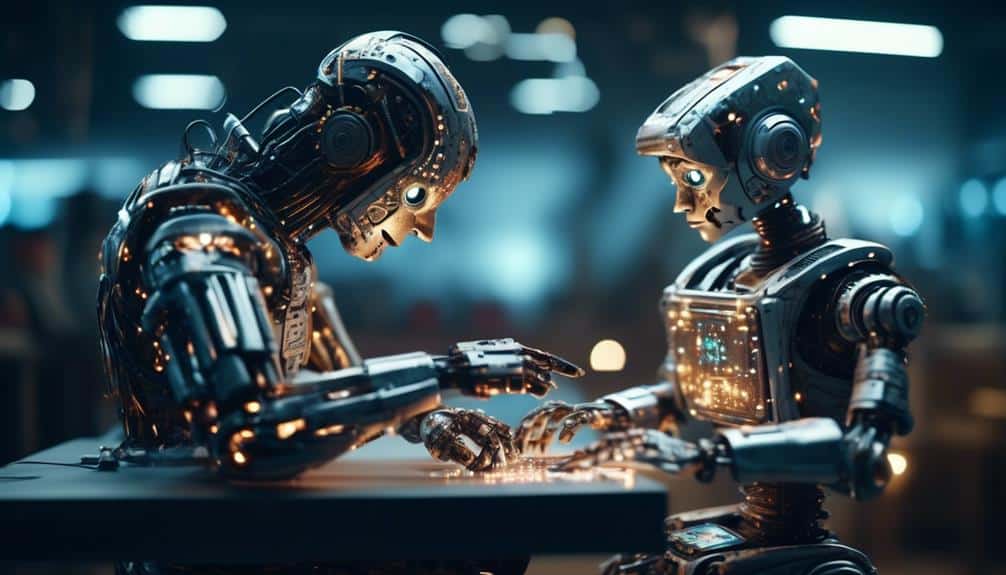
As artificial intelligence continues to shape content creation, future trends in content copyright are becoming increasingly critical to address in the evolving landscape of digital innovation. Copyright evolution is a key aspect that will define the future of content ownership.
With AI technologies being used to generate and manipulate content, questions surrounding who owns the rights to AI-generated work are becoming more complex. As AI becomes more sophisticated in creating original pieces, the traditional notions of copyright ownership may need to adapt to encompass these new forms of creation.
One trend that's emerging is the need for clearer guidelines on copyright ownership of AI-generated content. Currently, there's ambiguity regarding whether the AI creator, the programmer, or the organization utilizing the AI holds the rights to the content produced. Addressing these issues will be crucial in ensuring that creators are fairly compensated and that intellectual property rights are protected in this new era of content creation.
The evolution of copyright laws to encompass AI-generated content will be essential in providing clarity and fairness in determining ownership rights.
Frequently Asked Questions
How Can Content Creators Protect Their Work From Being Plagiarized or Stolen in the Digital Age?
To safeguard your creations in the digital era, employ robust copyright protection strategies. Utilize watermarks, metadata, and digital signatures to deter digital plagiarism. Stay vigilant by monitoring your content regularly and promptly addressing any instances of unauthorized use.
What Are the Potential Legal Implications of Using AI to Generate Content Without Proper Attribution?
When using AI to generate content without proper attribution, you may face legal implications. Ensure you credit the AI's contribution to avoid issues. Understanding the rules around AI attribution is crucial to navigate potential legal challenges.
To navigate inspiration and maintain creativity in an AI landscape, content creators must embrace innovation, explore unique perspectives, and infuse personal flair into their work. By daring to be different, you can stand out amidst AI-generated content saturation.
What Are the Ethical Considerations Surrounding the Use of AI in Content Creation, Particularly in Terms of Transparency and Accountability?
When using AI in content creation, consider transparency issues to ensure clarity on how AI contributes. Address accountability concerns by defining roles and responsibilities. Strive for openness about AI involvement to uphold ethical standards in content creation.
What Emerging Trends in Content Copyright Are Likely to Shape the Future Landscape of Content Creation and Ownership?
As content creation evolves, copyright reform and ownership rights are key. Technology's impact drives innovation strategies. Emerging trends will redefine content ownership, shaping the landscape. Stay vigilant, adapt to seize opportunities in this dynamic environment.
Conclusion
As the landscape of content creation continues to evolve, copyright laws face new challenges with the rise of AI technologies. Content creators must navigate the complexities of ownership and ethical considerations in this digital age.
Balancing innovation with copyright protection will be crucial for the future of content creation. It's imperative to stay informed and adapt to the changing trends in order to protect intellectual property rights and foster a creative and ethical content ecosystem.
